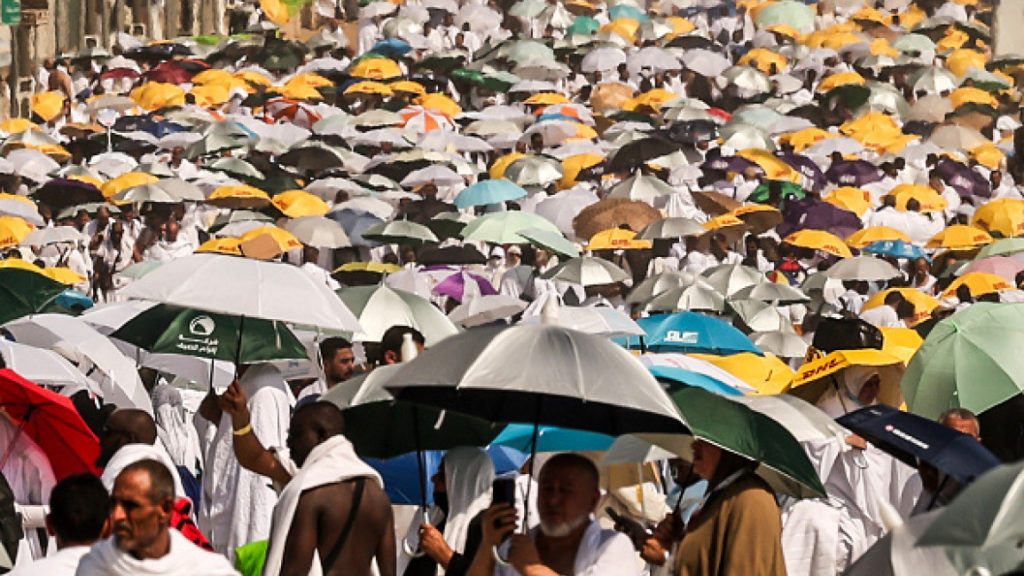
The number of fatalities among this year’s hajj pilgrims has exceeded 1,000, with the majority being unregistered individuals who undertook the pilgrimage under extreme heat conditions in Saudi Arabia.
Reports on Thursday highlighted that 58 Egyptians were among the newly recorded deaths. An Arab diplomat detailed that out of 658 deceased Egyptians, 630 were unregistered pilgrims.
Approximately 10 countries have collectively reported 1,081 deaths during the pilgrimage, a significant Islamic obligation that all Muslims who are able must perform at least once.
This year, the hajj coincided with the scorching Saudi summer due to its timing based on the lunar Islamic calendar.
The national meteorological center recorded temperatures reaching a high of 51.8°C (125°F) this week at Mecca’s Grand Mosque.
A recent Saudi study indicated that temperatures in the region are rising by 0.4°C each decade.
Annually, tens of thousands of pilgrims attempt to partake in the hajj through unofficial means due to the high cost of official permits.
Saudi authorities have reported removing hundreds of thousands of unregistered pilgrims from Mecca this month, yet many managed to participate in the main rituals starting last Friday. These individuals were particularly vulnerable, lacking access to air-conditioned spaces provided for the 1.8 million authorized pilgrims.
“People were exhausted after being chased by security forces before Arafat day. They were extremely fatigued,” an Arab diplomat commented on Thursday, referencing Saturday’s outdoor prayers that are the highlight of the hajj.
The primary cause of death among Egyptian pilgrims was the heat, which exacerbated conditions like high blood pressure and other health issues, the diplomat noted.
Egyptian officials are visiting hospitals to gather information and assist their pilgrims in obtaining medical care, the foreign ministry stated on Thursday.
“There are significant numbers of Egyptian citizens not registered in hajj databases, making the search for missing individuals and their families more challenging,” the statement added.
Egyptian President Abdel Fatah al-Sisi has directed that a “crisis cell” led by the prime minister manage the situation concerning the deaths of Egyptian pilgrims.
Sisi emphasized “the necessity of immediate coordination with Saudi authorities to facilitate the receipt of deceased bodies and streamline the process,” according to a statement from his office.
Additional deaths were confirmed by Pakistan and Indonesia on Thursday.
Of the approximately 150,000 Pakistani pilgrims, 58 deaths have been recorded so far, a diplomat reported. “Considering the number of people and the weather conditions, this is somewhat expected,” the diplomat remarked.
Indonesia, with about 240,000 pilgrims, raised its death toll to 183, compared to 313 deaths recorded last year, its religious affairs ministry reported.
Deaths have also been confirmed by Malaysia, India, Jordan, Iran, Senegal, Tunisia, Sudan, and Iraq’s autonomous Kurdistan region. Many authorities have not specified the causes of death.
Friends and relatives continue to search for missing pilgrims, checking hospitals and seeking updates online, fearing the worst.
Two diplomats disclosed on Thursday that Saudi authorities have commenced the burial process for deceased pilgrims, preparing the bodies and placing them in white burial cloths for interment.
“The Saudi authorities handle the burials. They have a system in place, and we adhere to it,” said one diplomat, whose country is notifying loved ones as efficiently as possible.
The other diplomat mentioned that informing many families in advance would be difficult, especially in Egypt, which has a high number of casualties.
Saudi Arabia has not released official death figures, but it reported over 2,700 cases of “heat exhaustion” on Sunday alone.
Last year, various countries reported more than 300 hajj-related deaths, predominantly among Indonesians.
With the hajj moving back approximately 11 days each year in the Gregorian calendar, next year’s pilgrimage will occur earlier in June, possibly in cooler conditions.
A 2019 study by the journal Geophysical Research Letters warned that due to the climate crisis, heat stress for hajj pilgrims will exceed the “extreme danger threshold” between 2047 to 2052 and 2079 to 2086, with increasing frequency and severity throughout the century.
 GhArticles.com Every News in Detail
GhArticles.com Every News in Detail


